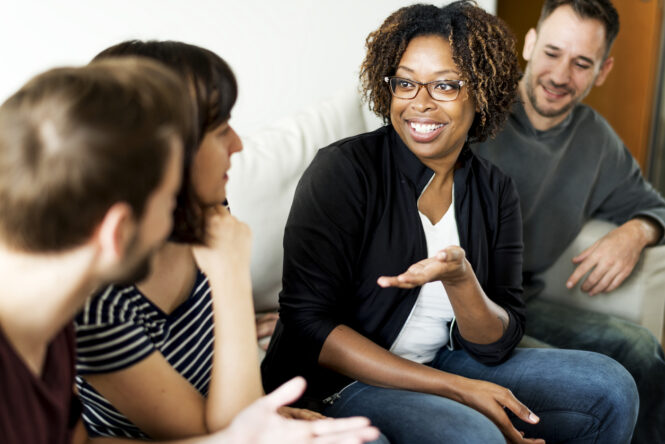Social awkwardness isn’t always as dramatic or noticeable as people think.

Nine times out of 10, it’s relatively subtle—something you sense in the rhythm of a conversation, the energy in a room, or the way someone deals with small social norms. Doing these things doesn’t mean someone is rude or incapable; they just show how uncomfortable they are in social situations that other people tend to breeze through without a second thought. Here’s how you know someone might be a bit socially awkward, even if they’re trying their best to hide it.
1. They struggle with when to make eye contact (or when to stop).

Someone who’s socially awkward may either avoid eye contact altogether or hold it just a bit too long. It’s not about being evasive or intense—it’s usually about not knowing where that invisible “comfortable” line is. Their discomfort becomes apparent during introductions or when emotions are high. They might look around the room while you’re talking or fixate a little too hard when they’re trying to show they’re listening.
2. They answer questions too literally.

If you ask how they are, they might launch into a full breakdown of their physical or emotional state. A question like “What’s new?” might get a long, detailed timeline rather than a casual, socially expected answer. It’s not that they don’t know how to communicate—it’s that they often miss those unwritten rules of small talk. Literal answers can feel overly formal or surprising in casual settings, especially when other people expect surface-level replies.
3. They don’t know how to end conversations.

When it’s time to wrap up, they might linger, awkwardly fumble for a closing line, or just stand there not knowing how to leave. Social exits don’t come easily to everyone, especially when it’s unclear whether the conversation is really over. This can lead to overstaying in conversations or leaving too abruptly. Either way, the transition from “we’re still talking” to “this is done” can be a confusing one for someone who’s socially awkward.
4. They talk too much, or barely at all.

Finding the balance between sharing enough and sharing too much can be tricky. Some socially awkward people overcompensate by filling every silence, while other people freeze up and give one-word answers. They’re often hyper-aware of how they come across, which makes it even harder to relax. So they might over-explain things, dominate the topic, or fade into the background to avoid getting it wrong.
5. Their humour sometimes goes over like a lead balloon.
 Source: Unsplash
Source: Unsplash They might tell jokes that feel slightly off, misread the mood, or laugh at moments that weren’t intended to be funny. It’s not that they don’t have a sense of humour. It just operates on a different wavelength. Timing and delivery can be tricky when you’re already anxious about how you’re being perceived. Sadly, when a joke falls flat, it often makes them even more hesitant to try again.
6. They interrupt without meaning to.
 Source: Unsplash
Source: Unsplash Excitement, nerves, or a fear of forgetting what they want to say can make them jump in at the wrong moment. They often realise it immediately and feel embarrassed, but the impulse is hard to control. They’re not trying to dominate the conversation. In fact, they’re often just struggling to find the right window to speak. Social pacing is more of an art than a science, and not everyone learns it naturally.
7. They miss subtle social cues.
 Source: Unsplash
Source: Unsplash Changes in tone, body language, or group dynamics can go unnoticed. They might keep talking when someone is clearly trying to wrap up, or they don’t pick up on sarcasm until well after the fact. These moments can make interactions feel slightly mismatched, like two people reading from different scripts. It’s rarely intentional. It just takes more effort for them to tune into what other people pick up on instinctively.
8. They overthink everything they said—after it’s too late.
 Source: Unsplash
Source: Unsplash Long after a conversation ends, they’ll replay every sentence, wondering if they sounded weird, said too much, or missed an opportunity to connect. It’s a loop that can turn one awkward moment into an all-day spiral. That overanalysis isn’t always visible, but it’s exhausting. It often makes them more hesitant the next time around, reinforcing the cycle of self-consciousness.
9. They struggle with group dynamics.

Blending into a group conversation is difficult when you’re unsure when to speak, how much to say, or where the social “invisible lines” are drawn. They might either dominate awkwardly or hang back completely. Group settings are filled with fast-moving cues—laughs, glances, topic changes—and it’s easy to get lost. For someone who’s already anxious, it can feel like trying to merge into traffic without knowing the rules of the road.
10. They don’t always match their tone to the situation.

They might speak in a monotone during an exciting conversation or react with unexpected intensity during a calm one. Tone matching is subtle, and not everyone picks it up naturally. That mismatch can make people misread them as rude, disinterested, or overly dramatic—when really, they’re just out of sync with the mood of the room. It’s more about nervousness than personality.
11. They give off “too much too soon” energy.

Some socially awkward people open up quickly, sharing deep or personal things with someone they just met. It’s not oversharing for attention; it’s often a genuine attempt to connect. However, because most people build intimacy gradually, this emotional leap can feel jarring. It often leaves them wondering why people pull back after they’ve shared something that felt brave or important.
12. They freeze when put on the spot.

Unexpected questions or being suddenly asked to speak in a group can cause them to mentally lock up. Their brain goes blank, or they stumble through an answer that doesn’t reflect how articulate they actually are. It can give people the impression that they’re nervous, disinterested, or unprepared, when in reality they just need a little more time to gather their thoughts.
13. They second-guess their presence.

They might constantly wonder if they’re wanted in a conversation or group. Even when they’re invited, they might assume they’re being included out of politeness rather than genuine interest. This can lead to them fading into the background, checking out early, or not showing up at all. It’s not because they don’t want to connect—it’s because they’re never sure if they truly belong.
14. They default to formality when they’re unsure.

In casual settings, socially awkward people might speak or act more formally than the situation calls for. It’s a way to cope with uncertainty—when in doubt, they lean into structure. It mmakesthem seem stiff or overly polite, especially in laid-back environments. But underneath, they’re often just trying to avoid making the wrong impression.




